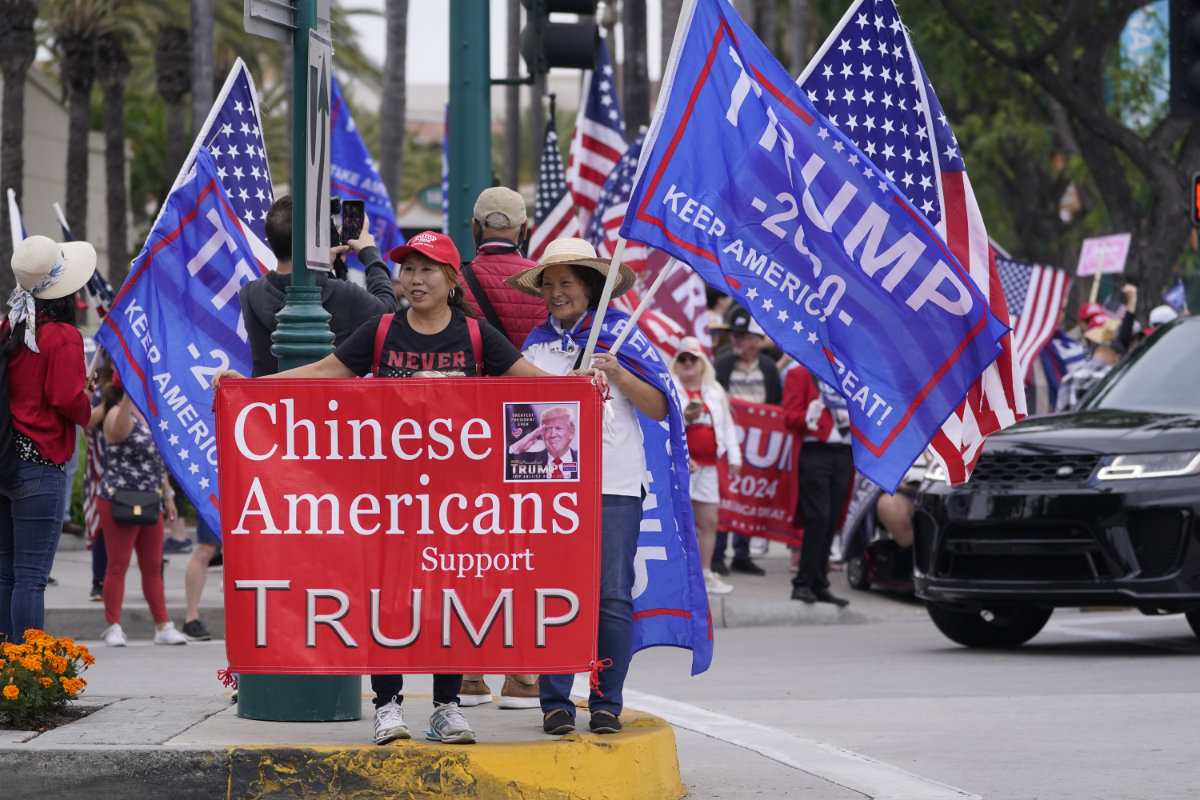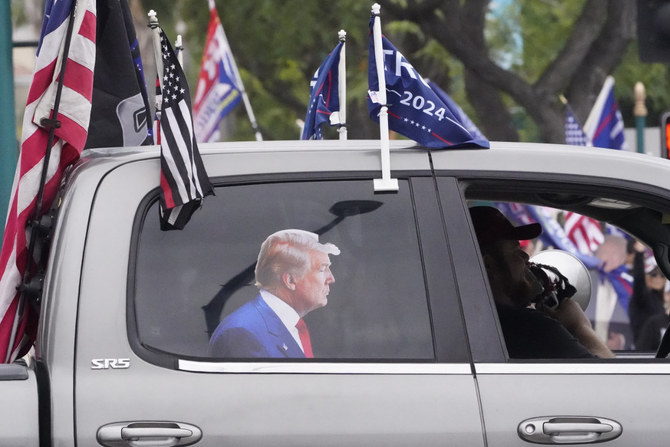ANAHEIM, California: In an occasionally dark and profane speech, Donald Trump on Friday sought to win over Republicans in California by complaining that rich people in Beverly Hills smell bad because they’re denied water, reiterating lies about widespread election fraud and calling on police to shoot people robbing stores.
While many of his remarks at the California Republican Party convention in Anaheim were familiar retreads of Trump’s attacks and grievances, his encouragement of violent retribution against criminals marked an escalation of his longstanding tough-on-crime message.
“We will immediately stop all of the pillaging and theft. Very simply: If you rob a store, you can fully expect to be shot as you are leaving that store,” he said, drawing loud applause. “Shot!” he added for emphasis.
Trump was one of several Republican presidential contenders appearing at the event in this Democratic stronghold. While there’s little hope for any of them to defeat President Joe Biden here in a general election, California will play a critical role in the slate of states voting on March 5 in the so-called Super Tuesday primaries.
With 169 delegates at stake, a win in California would move a Republican presidential candidate much closer to the nomination. And a recent rule change could give Trump, who is so far dominating the primary, an advantage. If he wins more than 50 percent of the vote, he would be awarded each of the state’s delegates.

Chinese Americans supporting former President Donald Trump stand outside the hotel where the 2023 Fall California Republican Convention is being held in Anaheim, California, on Sept. 29, 2023. (AP)
A Public Policy Institute of California voter survey released Wednesday, but conducted in late August and early September, found Trump with support from nearly half of the likely Republican primary voters. DeSantis was far back, at 14 percent, with the rest of the field lagging in single digits.
Trump’s comments on Friday underscored a central question surrounding Trump’s effort to return to the presidency. While his focus on red meat issues plays well with the GOP base, it’s unclear that it will hold much appeal with the broader set of voters needed to win a general election.
His remarks about crime, for instance, were especially pointed. In the past, Trump has proposed shooting migrants to prevent them from crossing the border. In his book and in interviews, former Defense Secretary Mark Esper alleged Trump inquired about shooting protesters during the George Floyd demonstrations. He has also proposed the death penalty for drug dealers, human traffickers and anyone convicted of killing a police officer.
During his first year in office, Trump advised police to be rougher in their handling of suspects being apprehended, telling recruits, “please don’t be too nice.”
“The word that they shoot you will get out within minutes and our nation, in one day, will be an entirely different place,” Trump said Friday. “There must be retribution for theft and destruction and the ruination of our country.”
Homicides and other violent crimes have risen in California, where residents have also been deluged with headlines from rampant car break-ins and drug use in San Francisco’s troubled Tenderloin district to street racing and illegal takeovers across a new $588-million bridge in Los Angeles.
Republicans see crime as a salient issue that can help them win back some of the suburban voters who have turned away from the party since Trump emerged as its leader and the Supreme Court overturned the constitutional right to an abortion. Several GOP presidential candidates and others in the party have pointed in particular to events this week in Philadelphia, where dozens of people face criminal charges after a night of social media-fueled mayhem in which groups of thieves, apparently working together, smashed their way into stores in several areas of the city.
Trump tapped into California Republicans’ exhaustion with their state’s Democratic leaders, who he said brought the state homelessness, open borders, high taxes, inequality, “woke tech tyrants” and rising crime.
California was once a symbol of American prosperity and creativity but is “becoming a symbol of our nation’s decline,” Trump said.
“We will reverse the decline of America and we will end the desecration of your once great state, California,” Trump said. “This is not a great state anymore. This is a dumping ground. You’re a dumping ground. The world is being dumped into California. Prisoners. Terrorists. Mental patients.”
Trump told his supporters “help is on the way,” falsely claimed his 30-point defeats here were the result of fraud and said, improbably, that he would win California in next year’s general election. He railed against using mail ballots on the same day the Republican National Committee launched its “Bank your Vote” initiative in New York, which urges Republicans to vote before Election Day. RNC Chairwoman Ronna McDaniel brushed off Trump’s continued skepticism.
“I think we have to take those fights on, but also understand that once it gets to game day, the rules that are on the field are what we need to play by and President Trump is all in on that,” she said.
Trump was in California just two days after he bypassed the second GOP debate held at Ronald Reagan’s presidential library northwest of Los Angeles, signaling again that he sees no need to appear side-by-side with lesser-known contenders.
Crowds at state party conventions tend to be thick with conservative grassroots activists, an ideal setting for the former president, even as he faces felony charges in four criminal cases.
Florida Gov. Ron DeSantis, Sen. Tim Scott of South Carolina and entrepreneur Vivek Ramaswamy were also scheduled to speak at the two-day convention being held at a hotel near Disneyland.
Waiting in line to enter the ballroom, Dan Cox, a real estate agent from Orange County and registered Republican, was sporting a “Keep America Great” cap and red tie, telegraphing his support for Trump. He lamented rising prices that have put homeownership out of the reach of many families in the state.
“I’m voting for someone who can get the job done,” he said, adding that he doesn’t trust Biden.
Not surprisingly, Democratic groups protested near the convention site.
“When the leading candidate of a major political party is under indictment for attempting to overthrow free and fair elections, every voter needs to stop and think about where our country is headed,” San Bernardino County Democratic Party Chair Kristin Washington said in a statement. “The last thing any American needs is to relive that madness.”



























